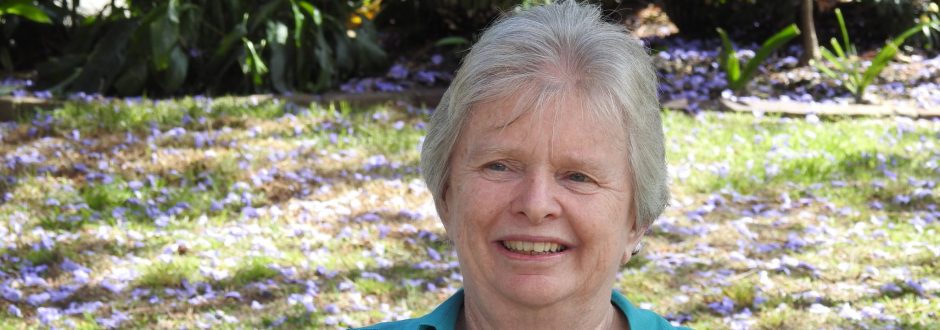Good Samaritan Sister Clare Condon says her congregation’s recent assembly highlighted for her the power of a single voice and the importance of networking together.
BY Clare Condon SGS
I’ve recently returned from a visit to Kiribati. For those who don’t know, the Republic of Kiribati is a remote island nation straddling the equator in the Pacific Ocean. It’s also where a small group of Good Samaritan Sisters have been ministering since 1991. I was there to witness the perpetual profession of Kakare Biita as a Sister of the Good Samaritan. She is the second I-Kiribati woman to do so.
Kakare’s profession ceremony was held in Abaokoro, a village in North Tarawa where one of our Good Samaritan communities is based. The other is in Temaiku, South Tarawa, a more densely populated area. Getting to Abaokoro isn’t a straightforward journey.
After crossing the Tarawa lagoon by boat, in the equatorial heat we walked up the 200-metre gravel pathway to the sisters’ community house. As I walked up that pathway, lined with over 2,000 small stones packed closely together, I was struck by the importance and power of storytelling.
Patricia Comerford, one of our Australian sisters who lived in Kiribati, slowly and painstakingly, in the hot, humid conditions of Kiribati, built this pathway, lining it with local stones and plants. The story of her patience and fidelity to the community she loves, as well as her love of the earth, continues to be told and retold among the I-Kiribati sisters, who now live out their own story at Abaokoro.
The Kiribati story is a relatively new branch of the Good Samaritan Sisters’ story. It is still young and vulnerable, but strongly grafted onto the original tree and the founding story, while preserving its unique cultural qualities.
These sisters from Kiribati, as well as sisters from the Philippines, Japan and Australia, joined with oblates and partners in ministry for a special assembly in Sydney during Easter week. This gathering was the fruit of a 12-month period of reflection, discussion and prayer.
We all came together with our own personal and communal stories. We came together to reflect upon our future life and mission – to put flesh on our vision, to focus on the future as a congregation of religious women living and ministering with other like-minded lay people. At this assembly, there was a strong and determined commitment to the “new shoots”, one of these being our mission with the people of Kiribati.
Religious life as we have known it in Australia over the past 100 or more years has changed, and we who profess the religious vows are being challenged to approach our lives and our commitments afresh, with a new focus and energy. We are being called to respond with gospel values to the most pressing social needs before us, as did our founding mothers and fathers.
While our recent assembly voiced a commitment to the “newer shoots” of Kiribati and the Philippines, it also expressed a strong commitment to the needs of refugees and asylum seekers, both by the simple act of befriending them in detention centres and in the community, and through advocacy for more just and humane treatment by government.
We also committed ourselves to responding to those most vulnerable in our society who, so often are women and children. The Japanese sisters brought to our attention the ongoing dangers of nuclear proliferation and the ongoing consequences of it for people in northern Japan. In the Philippines, addressing systemic poverty through education and community development are the challenges before us.
Having just landed back on Australian soil last Tuesday (May 13), I listened to the presentation of the national budget for Australia. I felt a great disappointment in the narrowness of the worldview presented – a worldview limited to growing the wealth of the few, a worldview bereft of a sense of the common good.
I was left wondering why our government’s focus for the nation is so self-serving. One area to be hit is overseas aid, and yet some of our closest neighbours in the Pacific, like Nauru, Kiribati and Tuvalu, are in desperate need of practical and financial support from the wealthy countries of Australia and New Zealand.
The Treasurer boasted about reducing the cost of responding to asylum seekers. Yet, if they were accepted into this country as residents, they could actually contribute to building the wealth of the nation. It would be worth documenting the contribution that Vietnamese boat people have made to Australian society over the past 30 years. Our nation’s current vision is short-sighted and based on fear; not on sound economics.
I was, however, heartened to read a recent statement from the Australian Catholic Bishops’ Conference, which clearly outlined to government the underlying truths of the cruel treatment of asylum seekers and refugees seeking protection in Australia. Let us all, like them, be encouraged to lobby our elected representatives to seek a more just society for those most in need.
Our recent assembly may seem small and insignificant alongside the big issues in our country and world. Yet, this gathering highlighted for me the power of a single voice and the importance of networking together for the common good of all humanity and God’s creation.
